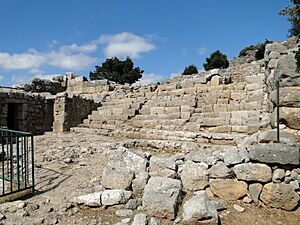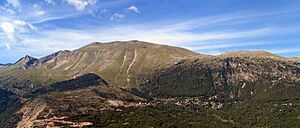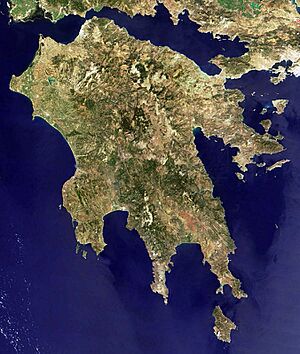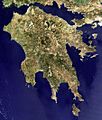Dorians facts for kids
The Dorians were one of the main groups of ancient Greeks. They were known as "Hellenes" and divided themselves into four big groups: Dorians, Aeolians, Achaeans, and Ionians. The Dorians are first mentioned in the ancient Greek poem, the Odyssey. This poem says they lived on the island of Crete.
Dorians had many different ways of life. Some lived in busy trading cities like Corinth. Corinth was famous for its fancy art and buildings. Others lived in isolated, military states like Sparta. Even with these differences, all Greeks knew which places were Dorian. Dorian states often helped each other in wars. Dorians were special because they spoke the Doric Greek dialect. They also had their own unique traditions and history.
In the 400s BC, the Dorians and Ionians were the two most powerful Greek groups. Their disagreements led to the big war called the Peloponnesian War. Historians still debate how much Greeks in that time thought of themselves as "Ionian" or "Dorian." Some think it wasn't a big deal. Others believe their group identity was very important.
Contents
Where Did the Dorians Come From?
People have different ideas about where the Dorians originally came from. One old theory says they came from the mountains of Greece. These areas include places like Macedonia and Epirus. From there, they moved south into the Peloponnese area and some islands in the Aegean Sea.
The Dorian Invasion Theory
Many modern experts believe the Dorians spread their Doric Greek language. This language is found in records from classical northwestern Greece, the Peloponnese, and Crete. Ancient writings like the Iliad show that East Greek speakers (Ionians) used to be strong in the Peloponnese. But then, West Greek speakers (Dorians) took over, at least in official areas.
This big change is linked to an event called the Return of the Heracleidai in ancient times. Today, we often call it the Dorian Invasion. This idea suggests that West Greek speakers from northwest Greece moved into the Peloponnese. They replaced the East Greek dialect with their own. We don't have many records from the Bronze Age to prove this. But West Greek speakers were definitely in western Greece later on.
Most experts today don't think the Dorian invasion was the main reason the Mycenaean civilization fell. The exact way West Greek speakers arrived in the Peloponnese is still a mystery.
Where Dorians Settled After Moving
Many Dorians settled in the Peloponnese region of Greece. But they also moved to other places. These included the island of Rhodes and parts of Sicily and Southern Italy. In Asia Minor, there was a group of six big Dorian cities called the Doric Hexapolis. These cities were Halikarnassos and Knidos in Asia Minor. Also Kos, Lindos, Kameiros, and Ialyssos on the island of Rhodes. These six cities later became rivals with the Ionian cities in Asia Minor.
Dorians also settled on Crete. People in classical times remembered their origins well. The historian Thucydides saw the Peloponnesian War as "Ionians fighting against Dorians." He also said that the people of Syracuse in Sicily were of Dorian background. Other "Dorian" colonies, started by people from Corinth and Megara, were found along the southern coasts of Sicily. The city of Taras was also a colony founded by Spartans.
Dorian Identity and Culture
What Does "Dorian" Mean?
The name Dōrieus (Dorian) appears on ancient clay tablets from Pylos. Pylos was a region later taken over by the Dorians. This name might have come from a place called Dōris. This was a small state in the mountains of west-central Greece.
Some scholars think the name Dōrieus comes from the Greek word dōris, meaning "woodland" or "upland." This would mean the Dorians were named after their wooded, mountainous home. Another idea is that it comes from doru, meaning "spear-shaft." This would make them "people of the spear" or "spearmen."
How Dorians Lived Together
Dorian society had a strong community feel. Men and women often had separate roles. The lives of free men were focused on military training. When they were not fighting, men lived in all-male houses. They trained for war until they were 30 years old, even if they were married.
Dorian women had more freedom and power than women in other Greek groups. Unlike other Greek women, Dorian women could own property. They could also manage their husbands' estates. They often had slaves to help with household chores. Women in ancient Sparta had the most power. This was probably because their men were away fighting for long periods.
Dorian women wore a type of dress called the peplos. This tunic was pinned at the shoulders. It had slits in the skirt that showed their thighs. This allowed them more freedom to move than the long, flowing dresses of Ionian women.
The Dorian Language
The Doric dialect was spoken in northwest Greece and the Peloponnese. It was also used on Crete, in southwest Asia Minor, and on the southern islands of the Aegean Sea. Many Dorian colonies in Southern Italy and Sicily also spoke it. After the classical period, the Attic dialect became more common. This led to the "common" Greek language used later.
A key feature of Doric was keeping the long 'a' sound. In Attic-Ionic Greek, this sound changed to a long 'e'. A famous example is what Spartan mothers told their sons before war: "ḕ tàn ḕ epì tâs" (either with it or on it). This meant "return alive with your shield or dead upon it." In Attic-Ionic, it would have been "ḕ tḕn ḕ epì tês." Today, a language called Tsakonian, which comes from Doric Greek, is still spoken in parts of the southern Peloponnese.
Other Dorian Traditions
Dorians had their own special calendar with important festivals. The Hyacinthia and the Carneia were especially important.
The Dorian mode in music was also linked to Dorian societies. Ancient writers said this music style had a strong, warlike feel.
In architecture, the Doric order was known for its simple and strong columns.
The Dorians also seemed to worship the sun god Helios a lot. His temples and holy animal herds were found in many Dorian areas. This suggests Helios was very important in their religion.
Stories from Ancient Times
Many ancient writers talked about the Dorians. The main ones who wrote about their origins were Herodotus, Thucydides, and Pausanias. Later writers, like Plutarch and Diodorus Siculus, also wrote a lot about Spartan customs.
Homer's Mention of Dorians
The ancient poem Odyssey mentions the Dorians once. It says:
- There is a land called Crete, a fair, rich land. Many people live there, more than you can count. They do not all speak the same language. There are Achaeans, native Cretans, Cydonians, and Dorians with waving plumes.
This mention suggests Dorians were on Crete even before the Mycenaean states fell. This makes historians wonder about the exact timing of the Dorian invasion.
Tyrtaeus, the Spartan Poet
Tyrtaeus was a Spartan poet who lived in the mid-600s BC. He advised the Spartans during a war against the Messenians. The Messenians were Achaeans who had been conquered by the Spartans. Tyrtaeus's poems helped establish the Spartan way of life. He wrote songs and poems for military training. He taught young Spartans to be very patriotic.
He wrote:
- For it is a good thing for a brave man to die fighting for his homeland. Let us fight hard for this land, and die for our children. Let us never spare our lives.
Herodotus's Account
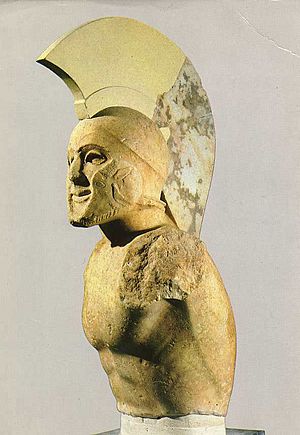
Herodotus was a historian from Halicarnassus, a Dorian city. He wrote about the Persian Wars. He also gave a short history of the Greeks and Persians.
Herodotus described the events of the "Dorian Invasion" as people moving from place to place. He said their first home was in Thessaly, central Greece. He explained that the Dorians moved many times. They lived in different places like Pthiotis, Histiaiotis, and Pindos. Finally, they came to the Peloponnese and were called Dorians.
Herodotus also said that the Greek language has always been the same. He believed that the Pelasgians, an older group, spoke a "Barbarian" (non-Greek) language.
Herodotus listed many Dorian states. These included Lacedaemon (Sparta), Corinth, Sicyon, and Epidaurus in the Peloponnese. Overseas, they settled on islands like Rhodes and Cos. They also founded cities in Asia Minor like Cnidus and Halicarnassus. Dorians also started towns on Crete, such as Lato.
Thucydides and the Peloponnesian War
Thucydides was another important historian. He said that after the Trojan War, Greece was still changing and settling. About 60 years after the Trojan War, the Dorians took control of the Peloponnese. This set up the conflict between the Dorians and the Ionians.
Thucydides noted that Dorian states did not always side with other Dorians. Some Dorian cities joined the Athenians, while some Ionian cities sided with the Spartans. He said the real reason for the Peloponnesian War was the growing power of Athens. This made Sparta feel worried.
Plato's View
In his work Laws, Plato wrote about the Achaeans. He said that after fighting in the Trojan War, they were driven out of their homes. They then moved under a leader named Dorieus. Because of this, they became known as "Dorians" instead of "Achaeans."
Pausanias and the Return of the Heracleidae
Pausanias wrote that the Achaeans were forced out of their lands by Dorians. These Dorians came from Mount Oeta, a mountain region near Thessaly. They were led by Hyllus, a son of Heracles. At first, the Achaeans defeated them. But under new leaders, the Dorians won and stayed in the Peloponnese. This story is called "the return of the Heracleidae."
Pausanias described how the Dorians conquered and settled in places like Laconia, Messenia, and Argos. From there, some Dorians moved to Crete and the coast of Asia Minor.
Diodorus Siculus's Stories
Diodorus wrote many traditional stories about the Dorians. He described how Heracles, a famous hero, helped the Dorians. The Dorians lived in a land called Hestiaeotis and were fighting against a stronger group called the Lapithae. Heracles helped them win. The Dorians promised him one-third of their land. Heracles asked them to keep his share safe for his descendants.
Images for kids
See also
Language
- Ancient Greek dialects
- Doric Greek
Mythology
- Dorus, the eponymous founder
- Dymas
- Heracleidae
History
List of Dorian states
 | Janet Taylor Pickett |
 | Synthia Saint James |
 | Howardena Pindell |
 | Faith Ringgold |


